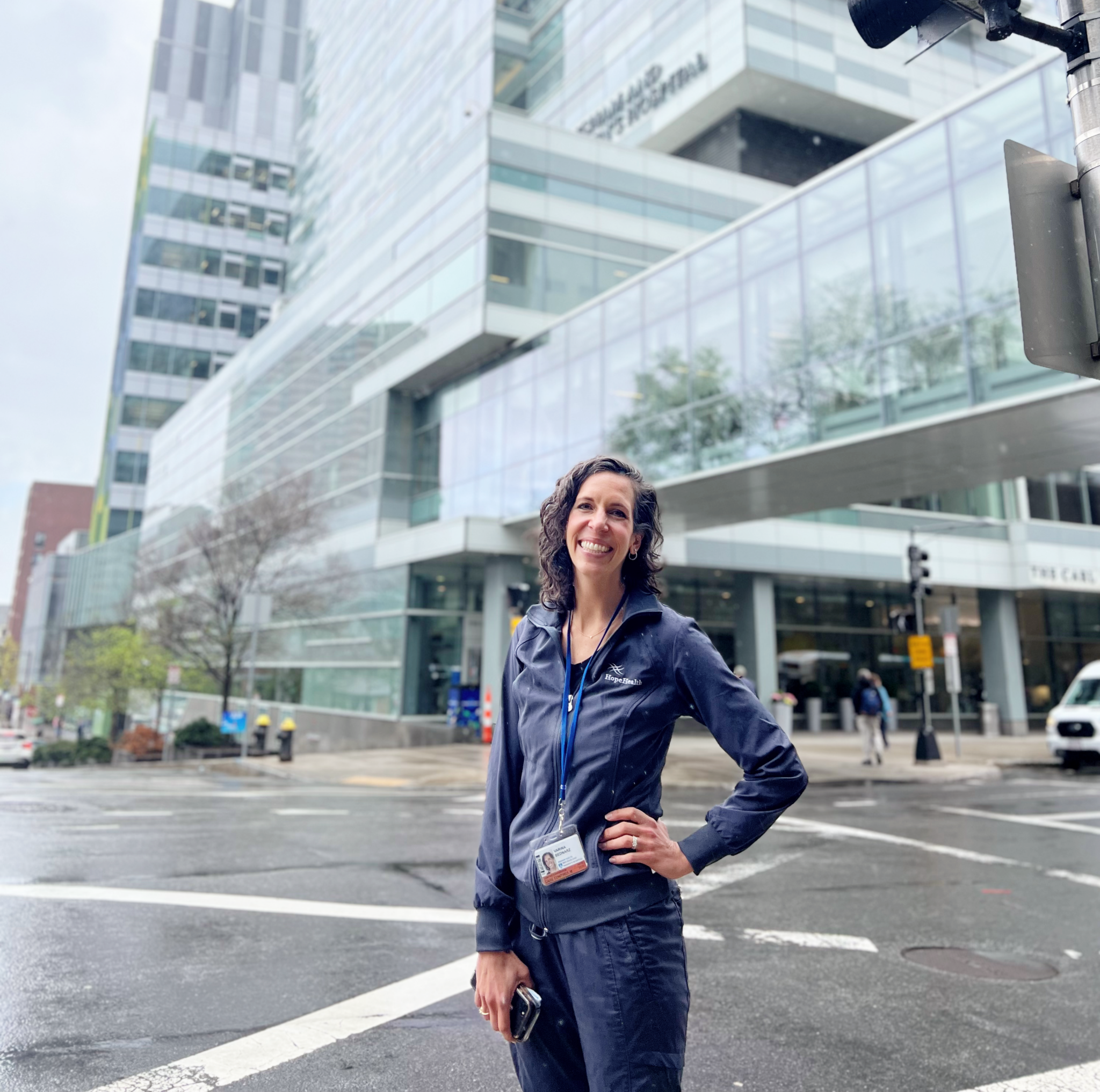“This work has felt like coming home for my heart and soul,” says Varina Bednarz, BSN. As a hospice nurse navigator, she compassionately guides patients and families — as well as their clinicians — through the nuances of end-of-life care.
Varina is part of HopeHealth’s inpatient hospice team embedded in Brigham and Women’s Hospital. In just its first year, her team has already become essential to the hospital and its Boston community.
In honor of Nurses Week, Varina shares a window into this work.
> Learn how to get started with hospice care.
You started nursing in acute care. What led you to hospice?
I’m always looking for authentic connection. I like to get in the thick of things with people, in the mess of relationships. I really loved working in the emergency room and ICUs. Over time, I was looking for even more of that individual connection.
I volunteered to give reiki at a local hospice, and it lit up a passion for end-of-life care. I ended up training as an end-of-life doula. I intended to keep nursing in acute care and do end-of-life work separately.
Then the pandemic hit. I was assigned to the COVID ICUs for several months. It was challenging and traumatic. It brought to the forefront of my attention that life is short. We don’t know what’s coming. It made me think: Why am I not doing what I really want to do, which is work in end-of-life care?
As the universe tends to do, when we’re ready, things present themselves. Around that time, a colleague informed me that HopeHealth was starting a new program at Brigham for inpatient hospice care. The week of orientation at HopeHealth, I remember looking around and thinking: These are my people.
> Related: “I hope I can pay this forward”: A hospice volunteer’s lasting impact
The hospice program recently celebrated its one-year anniversary at Brigham and Women’s Hospital. How has it impacted the hospital and community?
A huge facet of the job has been navigating relationships with clinicians and collaborating with them to provide hospice services. Another aspect is meeting with patients and families to gauge what their goals of care are, and explaining how additional support from hospice might help.
All of this adds up to a profound impact. Through this program, Brigham staff tell us they feel empowered in providing end-of-life care — you see a weight taken off their shoulders, knowing they have our support. Patients and families have a lot more information and autonomy to know where they’re at, and to make decisions about what they want in the time they have left.
In our first year, we served over 200 patients. We continue to grow. I am incredibly proud of our team and the success of our program.
What’s a challenge you face in end-of-life care, and how do you overcome it?
Of course, the nature of the work can be emotionally challenging. There are situations that remind you of the general heaviness of being human, how it can be so heartbreaking and filled with grief.
But when you can really just be present with people, and witness things without having to fix them, somehow this beautiful connection comes through. What a privilege, to be able to connect with someone in such a raw, sacred space. I find solace in that.
You hear that feedback from families too. They didn’t want you to take away their pain, they just wanted you to see it. It changes people, when they feel seen. That ability to connect person-to-person echoes some strength they have. They feel they can take one more step, go one more day.
> Related: In the halls of Hulitar: An inpatient hospice nurse opens up
What’s something that’s surprised you about this work?
The cultural norm is to not talk about death, to pretend it’s not part of our reality. But working in hospice has shown me that by not talking about it, we lose a chance to really see the things that can come from it.
So much love, so much meaning can happen in these end-of-life spaces. It’s been surprising to be reminded of that, and to see that over and over. You’ll be at a bedside and there are 30 family members who have not been together for years, all there to say goodbye to their loved one. So many heartfelt things come up.
When all the fluff goes away, when all the stuff that doesn’t really matter falls aside, when you’re sharing the human experience — the sacredness of this work is in that.
What’s one of your personal takeaways from hospice work?
The most humbling piece of this work is living with the awareness that this patient in front of me is another human who didn’t know how much time they would have.
Death is a reality we all face. It could be sooner, or it could be later. Knowing that makes me think, how do I want to live today?

